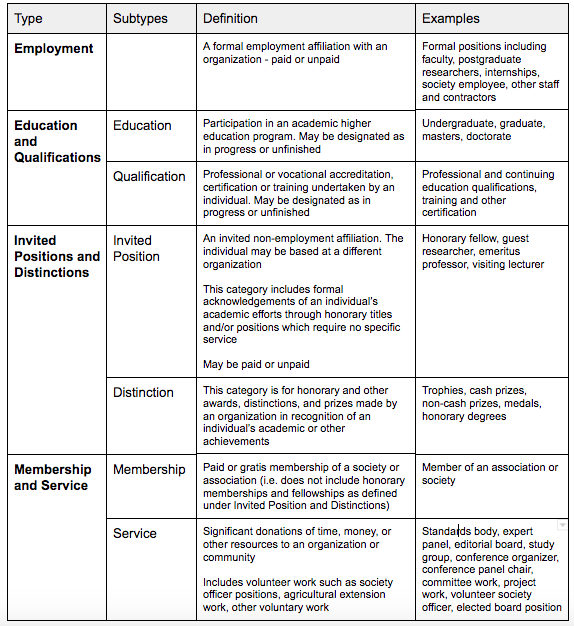The ORCID Registry currently supports two types of affiliations: education and employment. Affiliations can be added to the record – or asserted – directly by the user or, with the user’s permission, by an ORCID member organization. These organizational assertions make it easier for researchers to share information about their affiliations as they interact with ORCID-enabled research information systems.
In late 2017, ORCID reached out to the community to help shape how to extend affiliations to encompass a wider range of professional activities. There was an overwhelmingly positive response, and we received a lot of helpful advice. We have taken this feedback and used it to refine our proposal. Variations in practice and locality mean that this was not an easy task, but we are confident that our model strikes a good balance between usability, accuracy, simplicity, and consistency.
In the near future we will add support for several new types of affiliation; qualifications, invited positions, distinctions, memberships and service. These will be separated in the API, but combined in various ways in the user interface to keep it streamlined. We are now in the process of adding these new affiliation types to the Registry as shown in the table below:

There are many nuances to consider when categorizing affiliations and our model is designed to be flexible enough to accommodate them. Roles can have different definitions, and affiliation names can have different meanings depending on context and location.
A good example is “Fellow”, which can mean very different things in different institutions. There are also many affiliations that can potentially fit within more than one category; postdoctoral work is categorized by some as employment and others as education. Similarly society positions may be considered employment, membership, service, or an invited position depending on the society’s rules or current practice. And the list goes on…
To help with this, we will be providing guidelines for organizations that will be adding these new affiliations to the Registry, and also for those who would like to use them downstream.
The new affiliation types will be available in the first release of our new API 3.0 in a few weeks time – watch out for more information here soon and let us know if you’d like to help beta test the new API!
